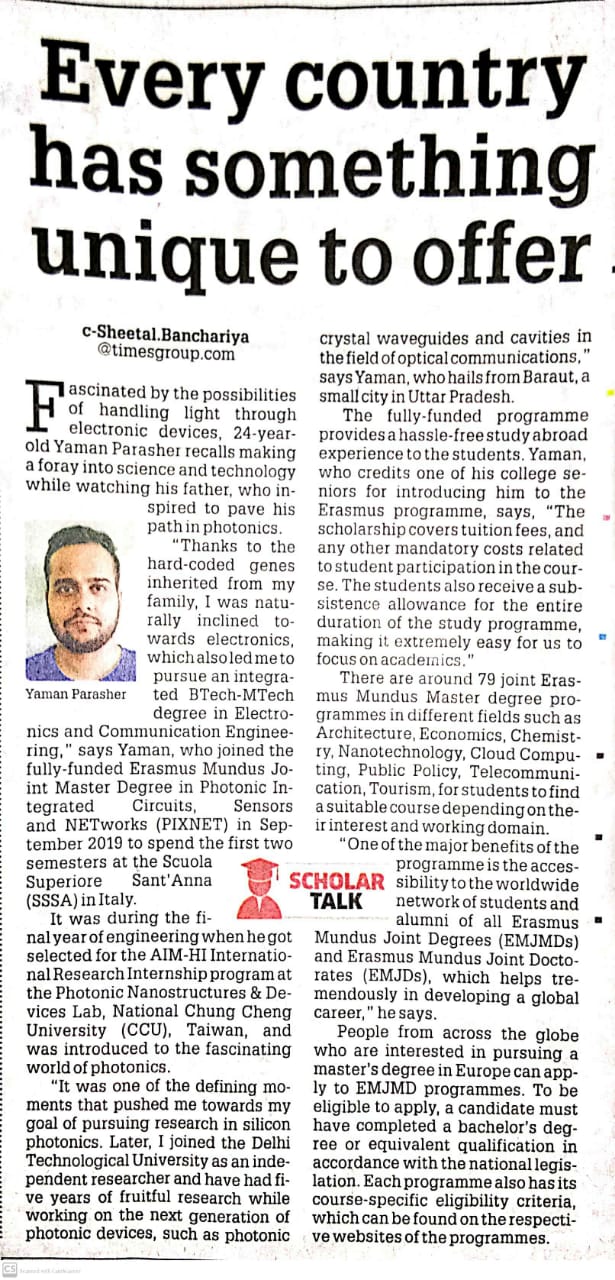Erasmus Mundus Scholarship - PIXNET
Sept. 2019 - August 2021 Erasmus Mundus Scholarship Photonic Integated Circuits, Sensors & NetworksErasmus Mundus is a prestigious, integrated, international study program, jointly delivered by an international consortium of higher education institutions in Europe that aims to bring a high level of exposure to a student in every aspect. In this, students from around the world compete for a limited number of scholarships when the annual selection rounds open. The program is very competitive, and the best candidates from different countries are admitted to the program. One of the main USP of this program is the accessibility to the worldwide network of all students and alumni of all Erasmus Mundus Joint Degrees (EMJMDs) and Erasmus Mundus Joint Doctorates (EMJDs) from around the world, which of course is very important for the career growth.

Last year in May 2019, I got selected for Erasmus Mundus Joint Master Degree in Photonic Integrated Circuits, Sensors & Networks (PIXNET), which is a two-year program (120 ECTS) aimed at training talented students in the design, creation, and assessment of innovative integrated devices based on photonic technologies. In this program, the admission committee assigns me the 6th mobility path which defines the “Theory and Techniques for Photonic Integrated Devices” curriculum in more than 3 top-ranked universities around the world. Starting from TeCIP Institute, Scuola Superiore Sant'Anna, Pisa, Italy for the (1st and 2nd semester), I will be attending Aston Institute of Photonic Technologies, Aston University, Birmingham, United Kingdom, the UK for the (3rd semester), followed by Osaka University,Osaka, Japan in the very last semester that is the (4th semester).
The set of learning outcomes of this degree program include the theoretical design of system/network devices, the design, and simulation of a photonic integrated circuit, fabrication in a cleanroom facility, and the packaging and final testing of the prototypes. Basically, It intends to be an interdisciplinary, multi-national initiative, training young telecommunication and electrical engineers to investigate the adoption of Photonic Integrated Circuit (PIC) as the central element in the evolution of information and communication devices (e.g. Data Centers, mobile terminals, etc.).
Apart from this, the collection of all the associated fabrication facilities will help me in acquiring theoretical and practical design skills in an integrated manufacturing environment, for the operation and maintenance of network systems and photonic devices fabrication that usually is not provided in a general electrical engineering master's. This level of exposure will allow me to understand both the different technologic steps and the environment in which production platforms of integrated photonics devices are standardized in a much broader sense. Besides, the added value of Osaka University (in the last semester) will help me get in touch with the most up-to-date innovation coming from the Japanese research community, which will keep me updated about the latest intervention of new associated technologies in the area of silicon photonics from around the whole world.
The given degree program exploits a significant complementarity of the expertise of the consortium partners and well-defined mobility paths that bring practical and specific competence to the prospective students. All partners of this program whether they are from academia or industry, have strong expertise in optical communication theory and techniques and extensive system and network experimental facilities. Three of them (SSSA, TUE, and ASTON) have fabrication also facilities for photonic integrated circuits and networks for device prototyping. A consortium asset capable of covering such a value chain in the theoretical design, block design and integration in a miniaturized integrated device (according to different integration technologies) is quite unique in the landscape of the European education system. That's the main reasons why I decided to pursue the prestigious Erasmus Mundus Joint Master Degree program from the associated world top-ranked universities in my area of expertise.
I truly believe that one simply can't get all the things in one place in a generic master's degree program from anywhere around the world except this program. The multi-dimension connection in this program will not only help me in getting connected to some of the highly a cited researcher from academia but also from the industry in my area of interest, that is I guess isn't possible in any other program from around the world.